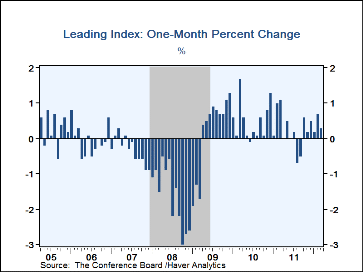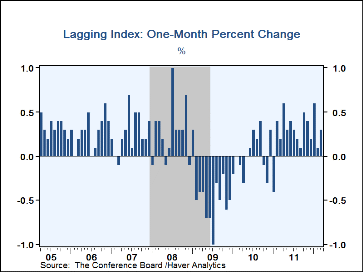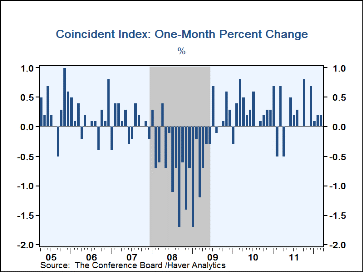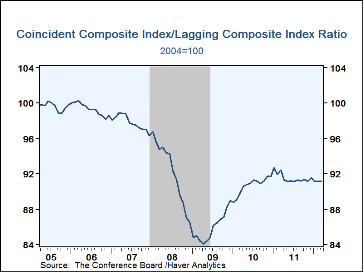 Global| Apr 19 2012
Global| Apr 19 2012U.S. Leading Indicator Gain Moderates
by:Tom Moeller
|in:Economy in Brief
Summary
The Leading Economic Indicator index from the Conference Board rose 0.3% last month after an unrevised 0.7% gain during February. A 0.2% increase had been expected. Last month a robust 70% of the series' components rose. That compares [...]
The Leading Economic Indicator index from the Conference Board rose 0.3% last month after an unrevised 0.7% gain during February. A 0.2% increase had been expected. Last month a robust 70% of the series' components rose. That compares favorably to last September's low of 25%. A steeper interest rate yield curve, more building permits and higher stock prices had the largest effects raising the overall leading index. The separate Leading Credit Index slipped for the third straight month and indicated tighter conditions versus the easy state of last summer and fall.
The index of coincident indicators again rose 0.2%. Higher manufacturing & trade sales, increased payroll employment and improved personal income made positive contributions to the index change last month. Industrial production was unchanged for the second consecutive month.
The index of lagging indicators, designed to measure economic slack, rose 0.3% after a 0.1% February uptick.
Another leading economic series is the ratio of coincident-to-lagging indicators. It measures how the economy is performing versus its excesses and was unchanged during the past year.
The Conference Board figures are available in Haver's BCI database; the components are available there, and most are also in USECON. The forecast figure for the Consensus are in the AS1REPNA database. Visit the Conference Board's site for coverage of leading indicator series from around the world.
| Business Cycle Indicators (%) | Mar | Feb | Jan | Y/Y | 2011 | 2010 | 2009 |
|---|---|---|---|---|---|---|---|
| Leading | 0.3 | 0.7 | 0.2 | 2.1 | 5.1 | 7.6 | -12.8 |
| Coincident | 0.2 | 0.2 | 0.1 | 2.5 | 2.8 | 2.5 | -7.7 |
| Lagging | 0.3 | 0.1 | 0.5 | 3.8 | 1.8 | -2.9 | -1.0 |
Tom Moeller
AuthorMore in Author Profile »Prior to joining Haver Analytics in 2000, Mr. Moeller worked as the Economist at Chancellor Capital Management from 1985 to 1999. There, he developed comprehensive economic forecasts and interpreted economic data for equity and fixed income portfolio managers. Also at Chancellor, Mr. Moeller worked as an equity analyst and was responsible for researching and rating companies in the economically sensitive automobile and housing industries for investment in Chancellor’s equity portfolio. Prior to joining Chancellor, Mr. Moeller was an Economist at Citibank from 1979 to 1984. He also analyzed pricing behavior in the metals industry for the Council on Wage and Price Stability in Washington, D.C. In 1999, Mr. Moeller received the award for most accurate forecast from the Forecasters' Club of New York. From 1990 to 1992 he was President of the New York Association for Business Economists. Mr. Moeller earned an M.B.A. in Finance from Fordham University, where he graduated in 1987. He holds a Bachelor of Arts in Economics from George Washington University.
More Economy in Brief
 Global| Feb 05 2026
Global| Feb 05 2026Charts of the Week: Balanced Policy, Resilient Data and AI Narratives
by:Andrew Cates










